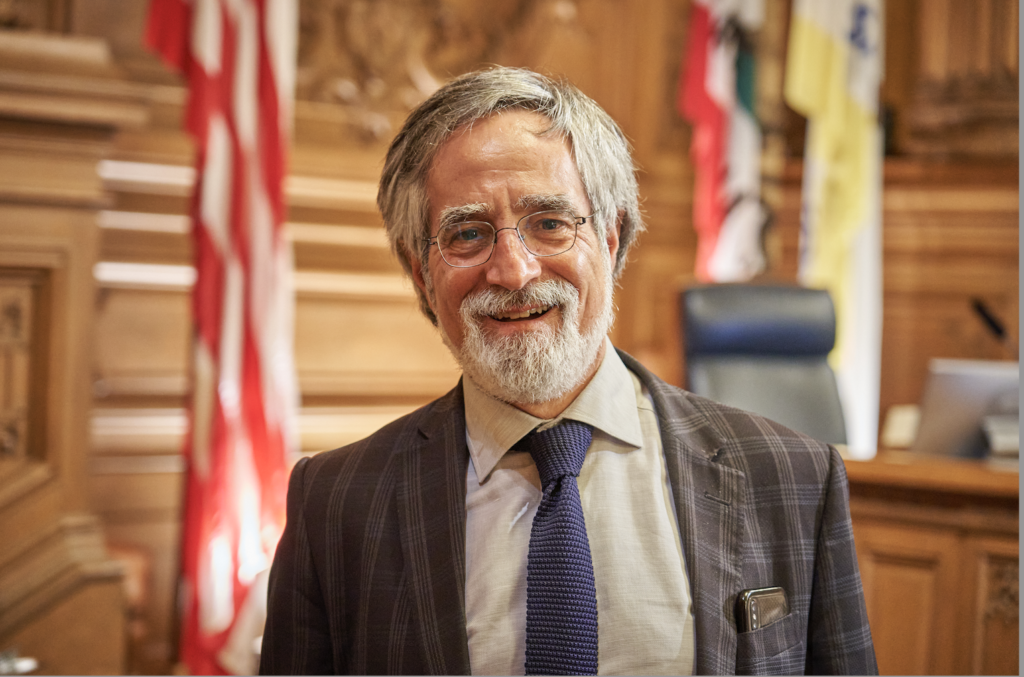Supervisors Aaron Peskin and Connie Chan are asking the city attorney for advice on whether San Francisco can sue the state to block the punitive actions set in motion by Sen. Scott Wiener’s housing bills.
In a Dec. 26 letter, the supes challenge
The State’s unfair legislative mandates that are diminishing our City’s ability to build the affordable housing our residents desperately need, and eroding our ability to meet our legal obligations to Affirmatively Further Fair Housing.
The argument is politically solid: The state is threatening to take away funding for essential city services, including affordable housing, and take away almost all local land-use controls, if developers don’t build a huge amount of new market-rate housing in San Francisco—but developers aren’t building much of anything right now, and the city can’t force them to.

The Planning Commission and the supes have already passed all of the “constraint reduction” bills the state asked for. That’s all they can do.
“We cannot force developers to build and yet new legislation would seek to penalize San Francisco anyway,” the letter states.

In fact, it notes:
70,000 units of housing are approved and ready to be built. Developers have chosen not to build. Yet the City is being penalized by allowing these same developers to essentially have peremptory powers over regular local processes.
Meanwhile, 46,000 of the new units the city is supposed to have under construction in the next six years by law have to be below-market-rate—and nobody at City Hall, including the mayor, sees any path to make that happen without state or federal funding.
Senator Wiener’s legislation, SB 828 which was signed into law in 2018, forced cities to rezone land and resulted in an explosion of San Francisco’s RHNA goals, 57% of which are made up of the three below market rate categories, with no additional State funding. This sets San Francisco up to underperform in all four RHNA categories. Not only has Senator Wiener set up San Francisco to fail, despite all our legislative and funding efforts, he added a last minute amendment to SB 423 that singles out San Francisco for streamlining in 2024, which is years earlier than every other jurisdiction in California. As a result, San Francisco is forced to approve unaffordable market rate housing developments across the City without any public input, well ahead of any other jurisdiction in the State. Instead, what we need from the State is a major investment in affordable housing.
It concludes:
We believe that SB 423 discriminates against San Francisco, contravening our status as a Charter City, diminishes our ability to build the affordable housing our residents desperately need, and thwarts our legal obligations to Affirmatively Further Fair Housing. This new law will create undue hardship on San Francisco and ultimately lead to displacement of small businesses, residential tenants, and homeowners in San Francisco. We respectfully ask that you present the Board of Supervisors with our legal options, including but not limited to litigation against the State.
Wiener told the Examiner that market-rate housing has to be central to the solution:
“Anyone who tells you that we can subsidize our way out of this disaster also has a bridge to sell you,” Wiener said. “The argument that we should only be building subsidized housing is an argument for a perpetual, severe housing shortage.”
Peskin told me that’s an argument “from a senator who hates his own Senate district.” The city has already approved 70,000 units of market-rate housing, and has cleared the way for a lot more. It’s the state Regional Housing Needs Assessment, not the Board of Supes, that insists that San Francisco needs 46,000 new units of affordable housing.
And yet nothing in any of Wiener’s bills provides a dime for new affordable housing.
Here’s the problem: Peskin and Chan can ask for advice, but San Francisco’s city attorney is an independently elected officer, and the supes alone can’t force him to sue anyone. It’s not entirely clear under the City Charter whether even the supes and the mayor together can direct Chiu to take legal action.
Chiu is a longtime Wiener ally and a friend of the Yimbys. The odds that he would challenge SB 432 are pretty low.
The supes could seek to hire outside counsel for the case—but again, under the charter, the city attorney would have to approve that.
Could a San Francisco citizen, or organization, sue? “That,” said Peskin, “is a very good question.”





